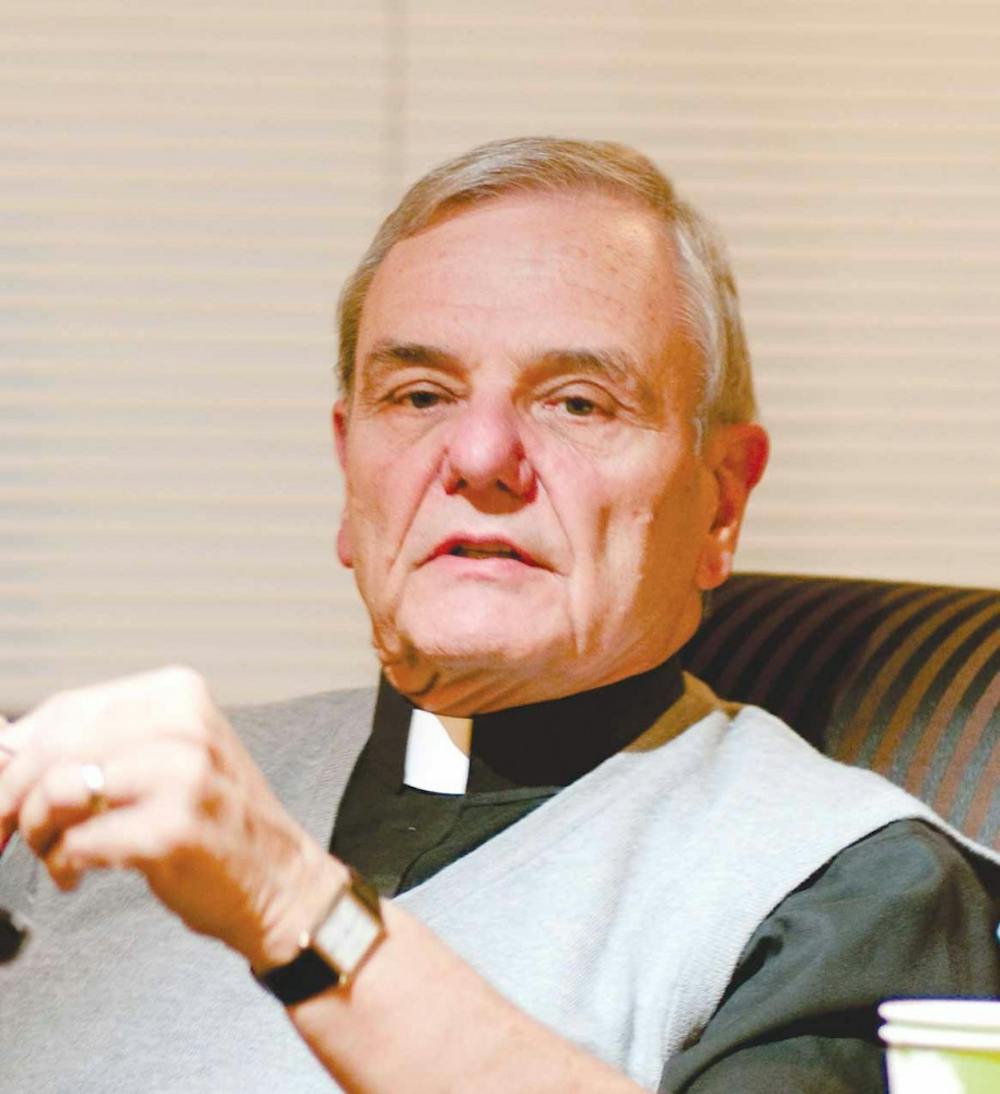GSP continues to have a conversation with the administration to revise the nondiscrimination policy
Executive Assistant to the President Fr. Gerry Olinger, C.S.C. (Scott Chia -- The Beacon)
By Laura Frazier, Staff Writer -- frazier13@up.edu
UP's Gay-Straight Partnership club is discussing with the administration the possibility of adding sexual orientation to the University's nondiscrimination policy.
Currently, the policy states: "The University, in its educational policies, programs, and procedures, provides equal opportunity for all its students without regard to race, color, religion, sex, age, national or ethnic origin or disability."
The fact that the policy does not include sexual orientation came to light last April. The president of Northwest Health Foundation, Thomas Aschenbrener, who was scheduled to be honored at the 75th Anniversary Gala for the School of Nursing, declined the invitation.
In past years, the Northwest Health Foundation had awarded the School of Nursing approximately $150,000 in grants.
Aschenbrener said he decided to not attend the gala after he learned that UP had refused a student's scholarship award from an organization that required the administration to sign a certification of nondiscrimination, which included sexual orientation.
UP President Fr. Bill Beauchamp, C.S.C., explained that the situation was a misunderstanding. "It was unfortunate there was a miscommunication on our part," he said. "There was no reason why we couldn't accept the scholarship that was offered."
Beauchamp said that UP gave the student a scholarship of the same amount.
Regardless, that situation prompted a serious discussion of UP's nondiscrimination policy, according to GSP president, senior Jayme Schroeder.
"The reason the policy isn't there is because there was no reason to change it," he said. "Now that it's getting attention, it's our time to look at it."
As a first step, members of GSP spoke with Beauchamp last spring. Now, they are working with Beauchamp's executive assistant, Fr. Gerry Olinger, C.S.C.
So far, GSP secretary sophomore Zack Muth is appreciative of how the administration is handling the issue.
"I feel like they are taking it seriously," he said. "They aren't just brushing it aside."
Olinger confirms that it is important for the University.
"It is important because it reflects our practice," he said. "The reality is, we don't discriminate based on orientation. The addition of sexual orientation would reflect that practice."
Olinger discussed the stipulations behind a potential policy change with the GSP faculty adviser, Fr. John Donato, C.S.C., and members of the executive board including Schroeder and Muth.
"The problem is that we have to sort out issues on two levels," Muth said. "We've got the legal framework and then the Catholic framework on top of that."
The main legal issue, according to Muth, is how changing the statement would affect UP's insurance policies. For example, while UP's insurance policies cover the spouse of a qualifying faculty member, employee or student, there is no domestic partner coverage.
Beauchamp also commented on the insurance issue. "First of all, the policy is that we will not discriminate on sexual orientation," he said. "But the concern is that if you put that in the policy, does that mean you have to buy health insurance for same sex married couples? That becomes problematic," he said.
Olinger explained that UP has to communicate with its law firm to understand what a change to the nondiscrimination policy would mean.
"Right now we are doing the legal legwork and seeing what adding the clause means for the University legally," Olinger said.
Additionally, as a Catholic university, UP must consider the Catholic Church's stance on sexual orientation.
"The fact the University is Catholic makes the process more complicated," Muth said.
GSP has also discussed with the administration the possibility of adding a separate statement about sexual orientation, instead of including it in the overall nondiscrimination policy.
However, Schroeder believes that while it would be a nice gesture, it would not carry the same legal weight.
Muth is hopeful that the administration will adopt a written policy that confirms that UP does not discriminate based on sexual orientation.
"I am confident that we can get some sort of affirmation in the Bulletin that says the University doesn't discriminate," he said.
Regardless of the current policy, Schroeder believes the University does not discriminate based on sexual orientation, to his knowledge.
"We don't feel like the school discriminates at all," he said.
Muth, however, is concerned that future issues could arise if the policy is not modified.
"If they have a right to discriminate, who knows," he said. "We would be doing an injustice to future students if we didn't try to resolve this."
If it is added, it is hard to predict how long it will be before the clause is added, if it is.
"There really isn't a distinct timeline for this issue," Muth said. "But we are hoping it's resolved by the end of the school year."
Schroeder wants to keep students informed and let the administration handle the process.
"We are going to keep communication lines open and keep doing what we do," he said. "We are just here to get information out to the student body."
Overall, Muth is glad the GSP and the administration are working well together and communicating more than before.
"I am hoping that this process we have been going through will lead to a more transparent communication with administration and students," he said. "I think this isn't something we will have to make a huge fuss about."
As Beauchamp put it, "If we can, it's not going to be a big deal."
GSP President Jayme Schroeder, senior (The Beacon)
GSP Secretary Zack Muth, sophomore (The Beacon)
UP President Fr. Bill Beauchamp, C.S.C. (The Beacon)
Executive Assistant to the President Fr. Gerry Olinger, C.S.C. (Scott Chia -- The Beacon)









